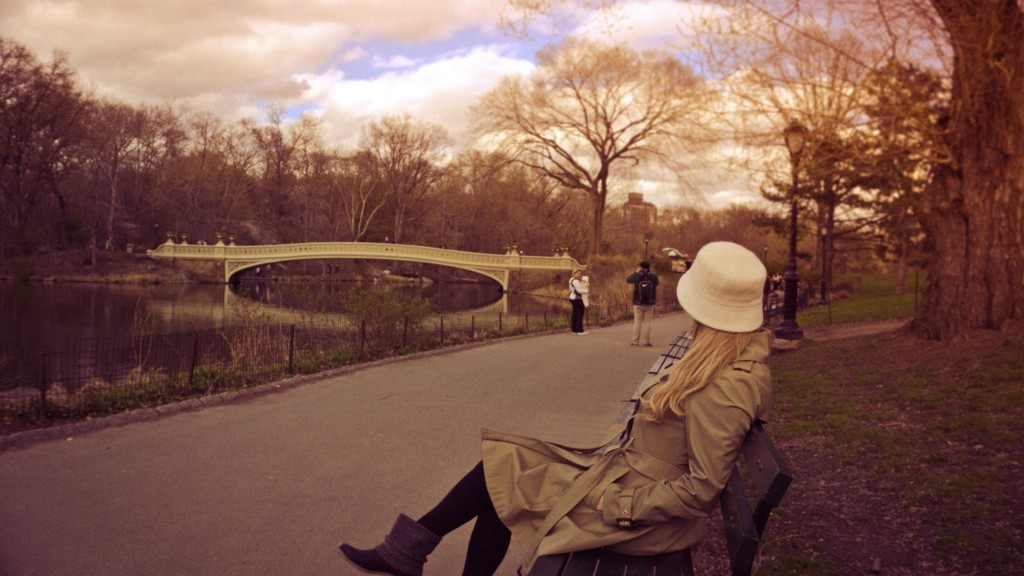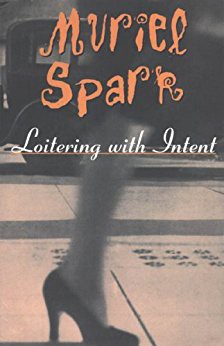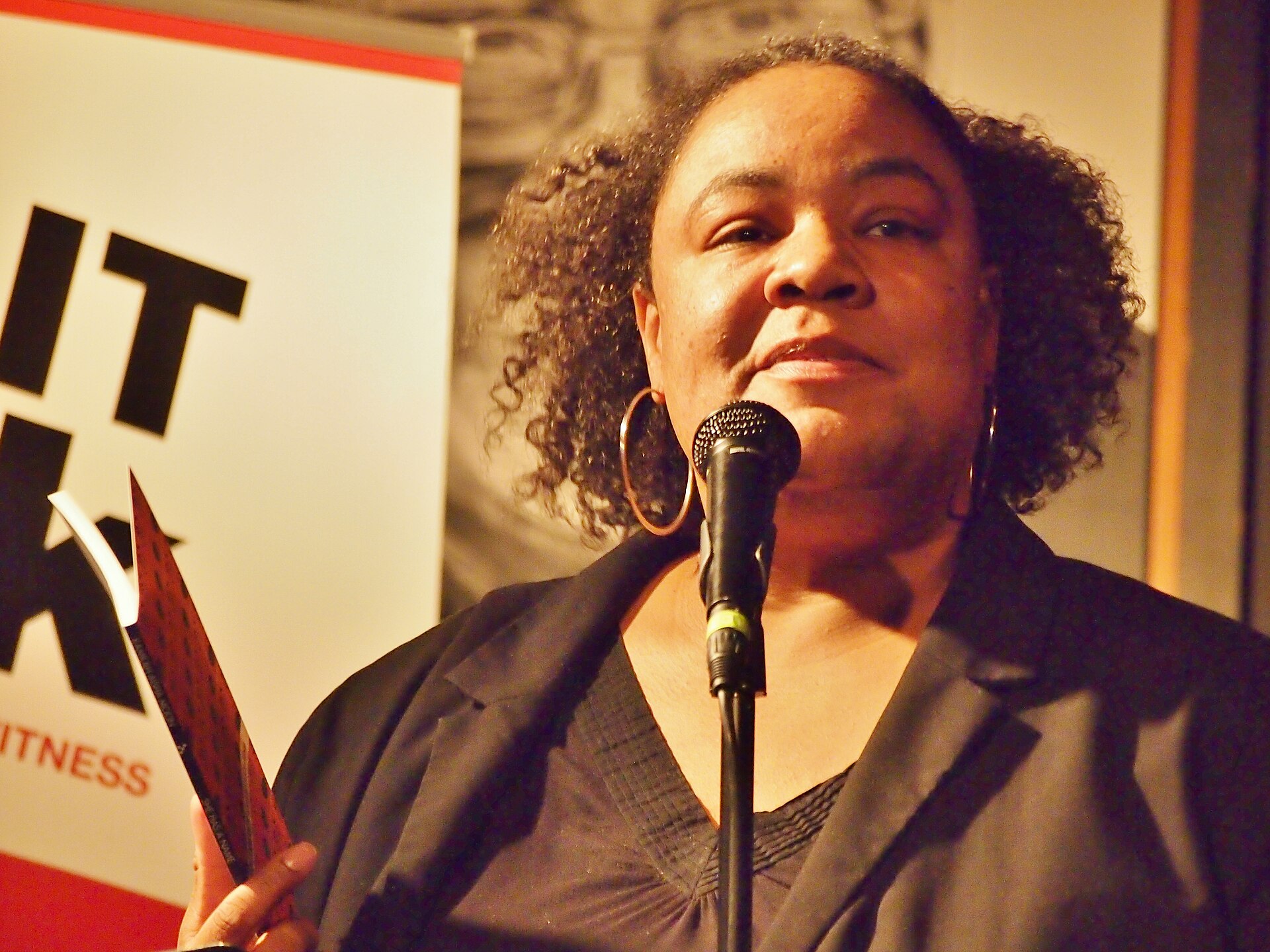Novel Gazing
Sometimes the Most Feminist Thing You Can Do Is Exist as a Woman in Public
What Muriel Spark taught me about the subversiveness of female loitering

Novel Gazing is Electric Literature’s personal essay series about the way reading shapes our lives. This time, we asked: What book was your feminist awakening?
I first read Muriel Spark’s Loitering With Intent on the steps of a pub terrace in Forest Hill, South London. I’d just finished university final exams, was in London for the foreseeable future, and didn’t know what I was doing.
I felt left behind, as if time had continued for everyone else but stopped for me. Classmates talked about their plans for Masters programs, traveling, and internships with the slightly desperate smiles of people who also didn’t know what they were doing but could afford to float. A couple of my friendships dramatically disintegrated. I read articles about how my generation were screwed and articles about how we were entitled; I’d stopped writing articles of my own, feeling overwhelmed by the sheer number of opinions and confessions in my online world. I applied for one to five jobs a day, tried to visualize a future. It was June 2015 and I was stuck.
Reading Loitering With Intent was not a bright Damascene moment but a sunny-morning awakening. I saw clearly, and recognized myself.
When I’d first encountered Spark at seventeen, I had believed that feminism was all about standing up to the patriarchy, not giving a fuck, dressing up, being strong, taking control of your sexuality and flaunting it. It meant identifying as a feminist, loudly and often. The feminist bloggers I followed talked about “eyeliner that could slay a man” and “weaponized femininity”. My idea of a feminist heroine was Cordelia from the young adult novel This Is All, who unabashedly confessed how she’d decided to have sex with her boyfriend at fifteen, in a church. I thought feminism was about rebelliousness and unashamed sexuality — in other words, not exactly Muriel Spark.
By this definition of feminism, though, I was failing: I didn’t look the part, I didn’t wear makeup, I wasn’t an extrovert, and I was…weird.
It had also begun to occur to me that feminism, in the shallow form I understood it, was asking a lot of women and the stories we told. We had to reject the pressure of beauty standards and adverts, but also look good and be confident. We had to be role models, good girlfriends, examples to the youth. We had to confront male power, but not be too nasty about it, unlike those “mean, man-hating feminists” in the 1970s. We had to be open about our sexuality and personal journeys so as to be understood, without knowing if anyone would make the effort to understand — but, we also had to make feminism look fun! It seemed as if being a feminist was a performance, and an exhausting one: constantly on the beat, correcting, confronting, destroying, confessing.
It seemed as if being a feminist was a performance, and an exhausting one: constantly on the beat, correcting, confronting, destroying, confessing.
Muriel Spark gave me a new model for a feminist hero, one that made more sense to me. The feminist act in Loitering With Intent wasn’t about deadly eyeliner or bold sexuality or anything else that seemed far out of my reach. It was about loitering — about the quiet subversiveness of simply existing in public as a woman.
The story begins in 1950 with Fleur, the twentysomething heroine, writing in a graveyard in Kensington. A policeman comes over and asks what she’s doing, and she answers calmly that she’s writing a poem. Once he leaves, she finishes her poem and stays in the graveyard until sunset.
So there I was in 2015, loitering on the steps of a pub, not knowing what on earth I was doing, reading about this woman who was also hanging around without excuse—and, far from “alone and palely loitering,” she’s having a great time doing it.
The story is about Fleur working a peculiar day job while she writes a novel. Refreshingly, there are no angsty scenes of her agonizing over a typewriter or complaining about writer’s block. Fleur loves to write and is shamelessly interested in everyone and everything around her: early on, she remarks that, “If [my landlord and his wife] had thrown me out I would still have had nothing much against them, I would mainly have been fascinated.”
Going against my previous conception of feminist heroines, the story isn’t hugely concerned with Fleur’s sexuality, or with her loudly defying social norms: the primary interest is how her life as an artist collides with her job. She has an unsatisfactory relationship with her patronizing, married literary critic boyfriend, but that’s casually introduced a quarter of the way through and Fleur’s attitude towards him is humorously unemotional. On being told that her boyfriend is using his wife and herself as cover for an affair with a man, she wonders “how he found the time for us all.” The love triangle and the boyfriend’s rival novel are key threads of the story, but the relationship doesn’t define Fleur, and she is — to the horror of his wife — more concerned with her own “thoroughly sick” novel than her boyfriend.
I connected with all of this, but there was a deeper reason I felt so strongly about Fleur. It was her lack of shame that stirred me.
As a teenager, I loved walking. We lived in a rough area of the city, where I was occasionally catcalled, told to stay away from certain streets and to avoid eye contact with groups of boys. At my all-girls’ school, “men in the area” were mentioned as if they were wolves lurking outside the gates. Once we even had a solemn school assembly in response to a girl who had been overheard boasting about her new red underwear on the train.
But nobody actually told me that I wasn’t allowed to walk because it wasn’t safe, and at first I didn’t put it together. I didn’t feel any self-consciousness about walking itself: if I was wearing purple tights and leg-warmers and someone stared at me, that was their problem. Sometimes I did get spooked, finding myself on a deserted side street or crossing the road to avoid a group of men, but I had an unreasonable feeling that if I simply stayed in motion I was uncatchable.
I now put my fearlessness down to the fact that as a queer neurodivergent person, being raised by my dad, I had a slightly different experience of girlhood. Being seen as a girl, but not exactly feeling like one. Being told to be wary or modest, but not really absorbing the message, never feeling truly unsafe. I felt anxious in crowded hallways or shopping malls, but when I walked I felt I was in control of my being, just as I did when I’d written something I was proud of. It also mattered that I’m white, and I find it hard to separate the freedom I experienced from knowing that my family was permissive and that being white in the U.K. affected my experience of walking: the responses of people around me, for example, and my confidence in having the right to walk alone and seek help from strangers if it was needed.
I know I was lucky that I was never in danger — but, writing that, I feel as if I’m saying sorry for having felt so free, so secure in the world. I’m not sorry. I wish girls were objectively safe and free everywhere.
On getting to university, I learned more about sexism and intersectionality, about other people’s experience of girlhood. I marched with Reclaim the Night. I talked to girls who wanted to write but didn’t see why their writing was worth showing to anyone, and I read work by girls struggling with shame. I went to writers’ groups where I and other women were talked over by kind, well-meaning men. Slowly it sank in, the message that other young women had received loud and clear long ago: This isn’t for you, you’re not safe on the street. Don’t write. Disappear. It hurt.
Slowly it sank in, the message that other young women had received loud and clear long ago: This isn’t for you, you’re not safe on the street. Don’t write. Disappear.
So I found it healing to read about a woman artist who is so simply, fearlessly present. Fleur doesn’t apologize for her art, and she doesn’t apologize for her presence on the street — or in the graveyard. I was starting to realize that in many ways, this takes more bravery than being brash or risque.
Later on in the novel, Fleur revisits the opening scene and adds that she asked the policeman: suppose she was committing a crime by sitting on the gravestone, what crime would it be? He replies that “it could be loitering with intent”: a good summing-up of Fleur’s sharp-eyed, watchful flanerie, of how she’s driven and yet content to observe. Loitering with intent is an interesting contradiction, for loitering is purposeless yet associated with people who are up to no good.
Recently, it’s felt hard to enjoy myself outside without noticing how public space is becoming ever more policed and privatized. In my hometown’s city center, in the shiny upper floor of the central railway station, there is a shopping mall with no seats. Nobody is allowed to sit on the floor, no homeless people are allowed, and anyone who lingers gets looks: why would anyone want to stand still, anyway? Why wouldn’t you be going somewhere? “If you see someone acting suspiciously…” yells the recorded announcement over the speakers. Policemen with guns stroll past in pairs.
Recently, it’s felt hard to enjoy myself outside without noticing how public space is becoming ever more policed and privatized.
So in places like this it’s increasingly hard to loiter, which I hate because loitering — existing in public without shopping — is so vital to me.
In her essay Radical Flaneuserie, Lauren Elkin quotes the poet Anne Boyer: “The flaneur is a poet is an agent free of purses, but a woman is not a woman without a strap over her shoulder or a clutch in her hand”. Elkin notes that:
… women experience [flanerie] in a particular way, wary of attracted unwanted attention, but also wanting to be noticed, to exist, to count, to be seen on their own terms. This is the radical move of the flaneuse: I will shop, or I won’t shop, but I am not defined by it either way.
In her underrated novel Rebuilding Coventry (1988), Sue Townsend tells the story of a housewife and mother, Coventry, who commits a murder and escapes to London without even a handbag. Catapulted into public space, walking back and forth between King’s Cross and Holborn, Coventry is unsure what to do with her hands:
there they are… at my sides, carrying nothing, holding nothing, pushing nothing… So I let them hang down and after a while I forget them and am comfortable. This is how men walk.
And here’s Fleur, loitering in Hyde Park:
… And I stopped in the middle of the pathway. People passed me, both ways, going home from their daily work, like myself… People passed me as I stood… The thought came to me in a most articulate way. “How wonderful it feels to be an artist and a woman in the twentieth century”… and I went on my way rejoicing.
Here is where making art and the act of loitering collide, with Fleur’s connection between the physical act of standing still in the London homeward rush, and opting out in a more serious way. She is a loiterer by virtue of being an artist who watches and maintains distance.
Throughout the story, Fleur critiques snobbery, hypocrisy, and male power without being able to do anything except fictionalize it. As a secretary working for a rich man she’s patronized, and for her commitment to being herself she is written off by her detractors as “sick,” “mad,” and “unwomanly.” Yet she is resilient, energized by her sheer curiosity. Regarding the bizarre nature of her day job, she says: “I preferred to stay in the job; I preferred to be interested as I was than happy as I might be. I wasn’t sure that I so much wanted to be happy, but I knew I had to follow my nature.” In the end, Fleur’s success is granted by her commitment to “following her nature” as a woman artist and observer.
Fleur says that, “there was a demon inside me that rejoiced in seeing people as they were, and not only that but more than ever as they were, and more, and more.”

It’s that act of detached one-sided observation, shading between empathy and voyeurism, that the flaneuse-artist engages in. Ideally, while the flaneuse-artist is out in public she doesn’t have to educate anyone, soothe their feelings or confront their sexism: she can simply process her surroundings, working off what she sees. Virginia Woolf wrote that “if I pass [a girl on the street] I can, without knowing I do it, instantly make up a scene… This is the germ of such fictitious gift as I have.”
A few months ago I saw Woolf’s statue in Tavistock Square for the first time, with these words on the brass plate:
Then one day walking round Tavistock Square I made up, as I sometimes make up my books, To the Lighthouse, in a great, apparently involuntary, rush.
I nearly cried to think of how Woolf adored walking, how the freedom and variety stimulated her.
And I felt sorry that so many women now feel unable to linger or walk peacefully, and how many have trouble creating anything because they were never given any space to make things up. There should be no danger for the woman walking. There should be no need for a woman to apologize for walking, observing, engaging, writing, letting her hands hang down, just being. Let us walk, let us stand still, let us make things up.
There should be no need for a woman to apologize for walking, observing, engaging, writing, letting her hands hang down, just being.
What joy to take up space on a page, on the street. What delight to stop in the homeward rush and loiter, fascinated with the world.
I used to think feminism was about renouncing shame, about confessing your sexual adventures and loudly confronting those around you on their sexism, about making yourself available as a source of education, a role model, a good example. But sometimes renouncing shame, and reclaiming your freedom and right to exist, starts by finding a heroine who is happy to just sit in a graveyard and write without apology, then go on her way rejoicing. I knew when I read Loitering With Intent that if there was space on the bookshelf for Fleur, there was space in the world for me.









